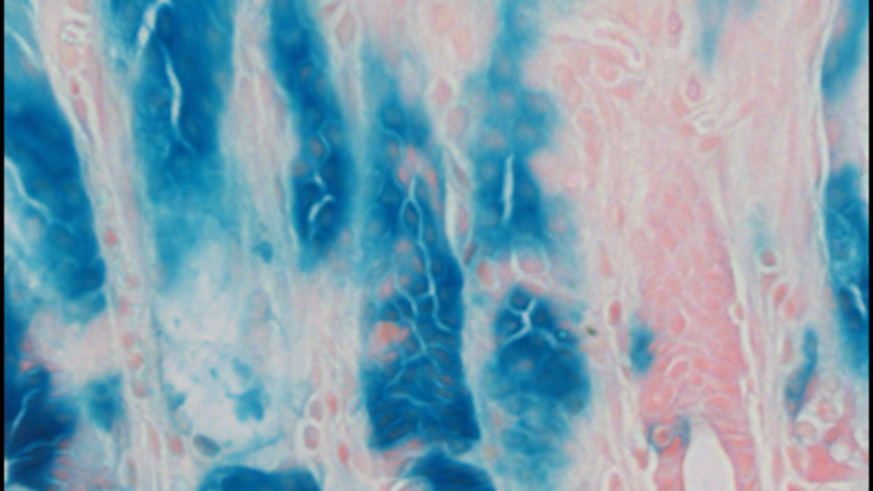Key insight into gastrointestinal cancer uncovered: Stem cells get the Frizzled look
6 October 2017

Key insights into the function of a receptor in the gastrointestinal tract and its role in cancer development has been recently uncovered by Dr Toby Phesse at the European Cancer Stem Cell Research Institute at Cardiff University, revealing a potential therapeutic target for treatment of GI cancer.
The Frizzled (Fzd) receptor transmits important Wnt signals in the gastrointestinal tract and is required for normal functioning of this tissue. Wnt signals are transmitted during normal conditions in the gastrointestinal tract as well as in response to damage when the intestine regenerates.
Through collaborative research, the project aimed to further understand Frizzled7’s role in the development of GI cancers.
In collaboration with Professor Elizabeth Vincan and Dr Dustin Flanagan at the Doherty Institute, University of Melbourne, they observed that Frizzled7 was highly expressed in intestinal stem cells.
By further collaborating with stem cell pioneers in Singapore, Professor Hans Clevers and Professor Nick Barker, they were able to develop a strategy to delete Frizzled7 within intestinal stem cells, and this demonstrated that Frizzled7 was the predominant receptor that allowed intestinal stem cells to transmit essential Wnt signals; This study paved the way for further investigation into the function of this receptor in the stomach.
Cutting edge technology showed that Frizzled7 is required to maintain normal conditions in the stomach, and when deleted, the whole stomach repopulated with normal cells.
In addition to the critical role that Wnt signalling plays in maintaining the normal conditions in the gastrointestinal tract, it is also seen to become deregulated during several types of cancer - including intestinal and gastric cancers.
The team uncovered the role of Frizzled7 in colon cancer cells, discovering that it was required for the transition of these cells, enabling them to seed at a new site in the body after they have left the primary tumour.
This research highlights Frizzled7’s potential as a target in cancer treatments.
Dr Phesse said: “These important discoveries have enhanced our understanding of how Wnt signalling regulates cell function in normal tissue and cancer cells, and has revealed that the Wnt receptor Fizzled7 is an attractive therapeutic target for treatment of cancer.
“This is now the focus of future collaborative work between my lab in the European Cancer Stem Cell Research Institute at Cardiff University and the groups of Professor Vincan in Australia, Professor Clevers in Holland and Professor Barker in Singapore, and highlights the benefits of collaborative research.
“It will be exciting to see in the coming years the full extent of how targeting this receptor can benefit cancer patients.”
References
1. Dustin J. Flanagan*, Toby J. Phesse*, Nick Barker*, Renate H.M. Schwab, Nancy Amin, Jordane Malaterre, Daniel E. Stange, Cameron J. Nowell, Scott A. Currie1, Jarel T.S. Saw, Eva Beuchert, Robert G. Ramsay, Owen J. Sansom, Matthias Ernst, Hans Clevers, Elizabeth Vincan. Frizzled7 Functions as a Wnt Receptor in Intestinal Epithelial Lgr5+ Stem Cells. (2015) Stem Cell Reports 4(5):759-67 *Authors contributed equally.
2. Dustin J Flanagan, Renate HM Schwab, Bang M Tran, Toby J Phesse*, Elizabeth Vincan*. Isolation and culture of adult intestinal, gastric and liver organoids for Cre-recombinase mediated gene deletion.(2016) Book chapter inMethods in Molecular Biology by Springer Protocols. PMID: 27704362. *Authors contributed equally.
3. Dustin J Flanagan, Nick Barker, Cameron Nowell, Hans Clevers, Matthias Ernst, Toby J Phesse*, Elizabeth Vincan*. Loss of the Wnt Receptor Frizzled7 in the Gastric Epithelium is Deleterious and Triggers Rapid Repopulation In Vivo. (2017). Disease Models and Mechanisms doi:10.1242/dmm.029876 [Epub ahead of print]. *Authors contributed equally.
4. Schwab RHM, Amin N, Flanagan DJ, Johanson TM, Phesse TJ*, Vincan E*. Wnt is necessary for mesenchymal to epithelial transition in colorectal cancer cells. (2017) Dev Dyn. May 30. doi: 10.1002/dvdy.24527 [Epub ahead of print]. *Authors contributed equally.
5. Phesse T,Flanagan D, Vincan E. Frizzled7: A Promising Achilles' Heel for Targeting the Wnt Receptor Complex to Treat Cancer. (2016) Cancers May 17;8(5). pii: E50.
6. Flanagan DJ, Vincan E, Phesse TJ. Winding back Wnt signalling: potential therapeutic targets for treating gastric cancers. (2017) British Journal of Pharmacology. Jun 1. doi: 10.1111/bph.13890 [Epub ahead of print].
